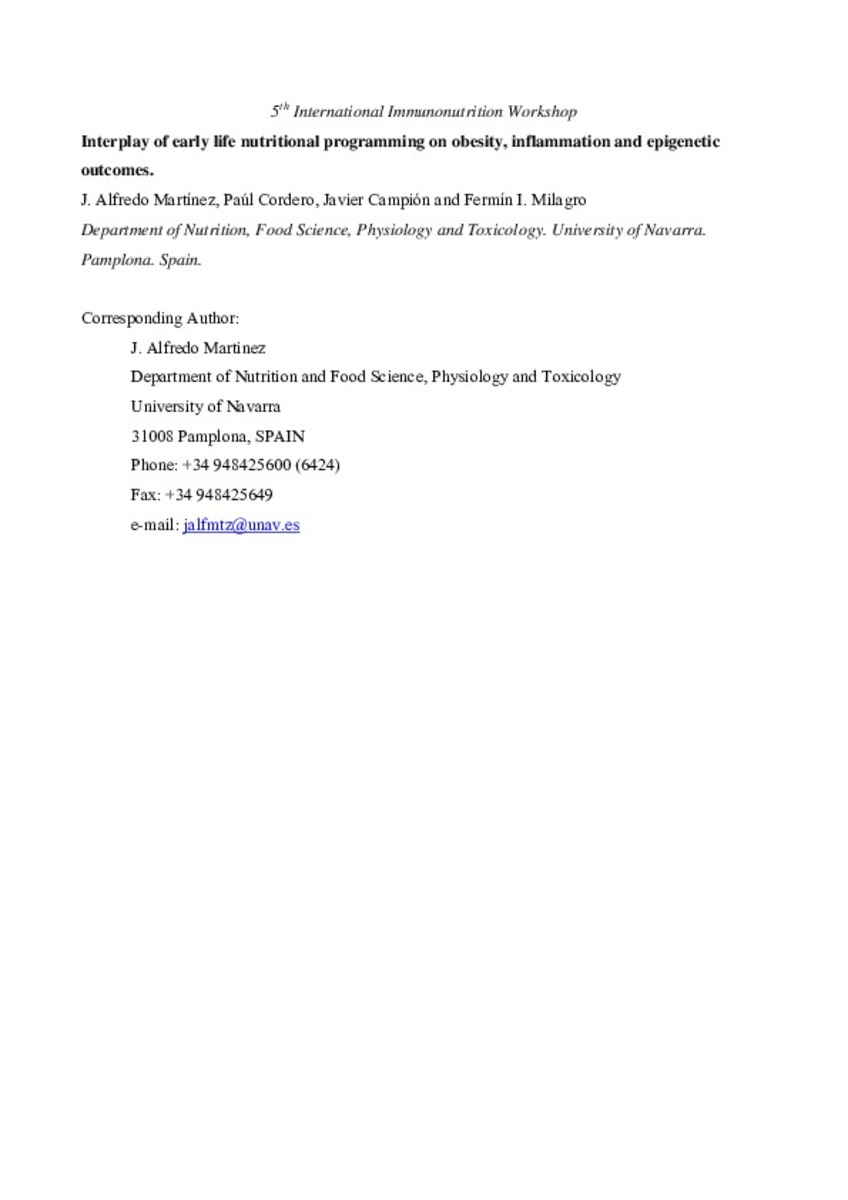Full metadata record
| DC Field | Value | Language |
|---|---|---|
| dc.creator | Martinez, J.A. (José Alfredo) | - |
| dc.creator | Cordero, P. (Paul) | - |
| dc.creator | Campión-Zabalza, J. (Javier) | - |
| dc.creator | Milagro-Yoldi, F.I. (Fermín Ignacio) | - |
| dc.date.accessioned | 2012-08-22T10:58:24Z | - |
| dc.date.available | 2012-08-22T10:58:24Z | - |
| dc.date.issued | 2012 | - |
| dc.identifier.citation | Martinez JA, Cordero P, Campion J, Milagro FI. Interplay of early-life nutritional programming on obesity, inflammation and epigenetic outcomes. Proc Nutr Soc 2012 May;71(2):276-283. | es_ES |
| dc.identifier.issn | 0029-6651 | - |
| dc.identifier.uri | https://hdl.handle.net/10171/23062 | - |
| dc.description.abstract | The huge health burden accompanying obesity is not only attributable to inadequate dietary and sedentary lifestyle habits, since a predisposing genetic make-up and other putative determinants concerning easier weight gain and fat deposition have been reported. Thus, several investigations aiming to understand energy metabolism and body composition maintenance have been performed considering the participation of perinatal nutritional programming and epigenetic processes as well as inflammation phenomena. The Developmental Origins of Health and Disease hypothesis and inheritance-oriented investigations concerning gene–nutrient interactions on energy homoeostasis and metabolic functions have suggested that inflammation could be not only a comorbidity of obesity but also a cause. There are several examples about the role of nutritional interventions in pregnancy and lactation, such as energetic deprivation, protein restriction and excess fat, which determine a cluster of disorders affecting energy efficiency in the offspring as well as different metabolic pathways, which are mediated by epigenetics encompassing the chromatin information encrypted by DNA methylation patterns, histone covalent modifications and non-coding RNA or microRNA. Epigenetic mechanisms may be boosted or impaired by dietary and environmental factors in the mother, intergenerationally or transiently transmitted, and could be involved in the obesity and inflammation susceptibility in the offspring. The aims currently pursued are the early identification of epigenetic biomarkers concerned in individual's disease susceptibility and the description of protocols for tailored dietary treatments/advice to counterbalance adverse epigenomic events. These approaches will allow diagnosis and prognosis implementation and facilitate therapeutic strategies in a personalised ‘epigenomically modelled’ manner to combat obesity and inflammation. | es_ES |
| dc.language.iso | eng | es_ES |
| dc.publisher | Cambridge University Press | es_ES |
| dc.rights | info:eu-repo/semantics/openAccess | es_ES |
| dc.subject | Obesity | es_ES |
| dc.subject | Inflammation | es_ES |
| dc.subject | Epigenetics | es_ES |
| dc.subject | Developmental origins of health and disease | es_ES |
| dc.title | Interplay of early-life nutritional programming on obesity, inflammation and epigenetic outcomes | es_ES |
| dc.type | info:eu-repo/semantics/article | es_ES |
| dc.type.driver | info:eu-repo/semantics/article | es_ES |
| dc.identifier.doi | http://dx.doi.org/10.1017/S0029665112000055 | es_ES |
Files in This Item:
Statistics and impact
Items in Dadun are protected by copyright, with all rights reserved, unless otherwise indicated.






